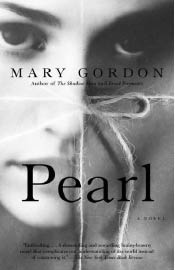"Pearl" by Mary Gordon
by Jill Froebel

Anchor Books, 2006 $14
Pearl is a daring novel, written in a complex, gutsy style that reaches toward the sublime with a conscientious, inquisitive style and lofty subject matter. Ultimately, though, it falls flat. The novel’s attempt at stream of consciousness prose and a heavy-handed reliance on rhetorical questions, pseudo-psychological drama and unlikable characters creates a morose rather than interesting environment, and actually finishing the novel becomes more of chore than the escapist act summer reading, by all rights, should be.
The novel begins on a cold Christmas night in New York City, with a single mother stepping back into her apartment after spending the night out with friends. The light on her answering machine blinks red, and she smiles inwardly at the thought of a message from her college-aged daughter, a continent away studying Gallic at Trinity College in Dublin. Instead of well-wishes from her progeny, however, an unfamiliar voice on the machine alerts the mother, Maria Meyers, that her daughter is involved in an emergency in Ireland. Maria learns that her daughter, Pearl, has chained herself to a pole outside the American embassy in Dublin, with plans to starve to death as an act of protest. Her world rapidly spinning out of control, Maria begins her journey to Ireland to save her daughter, and Gordon turns her highly stylized efforts towards explaining the history and circumstances that culminate in Pearl’s unthinkable demonstration.
Though the novel is promising in premise, its potential disintegrates as rapidly as Maria Meyers’ safe cocoon of a life; and reading the book becomes both monotonous and unrewarding. Maria, rather than appearing as a likeable and vulnerable mother, comes across as a whiny, spoiled socialite, and her daughter Pearl is too full of youthful naiveté and an unpleasant shallowness to make her protest gripping. Gordon is obviously a talented writer; her past works have been far more enjoyable. However, in this latest effort, she seems to be more concerned with literary acrobatics than with producing an enjoyable tale. This novel, full of dreary places and insistent self-reflection, becomes a tiresome disappointment.
|
Issue Navigation> Issue Index > v5n25: War Heads (6/22/06) > "Pearl" by Mary Gordon This Week's Issue • Artvoice Daily • Artvoice TV • Events Calendar • Classifieds |









 Current Issue
Current Issue